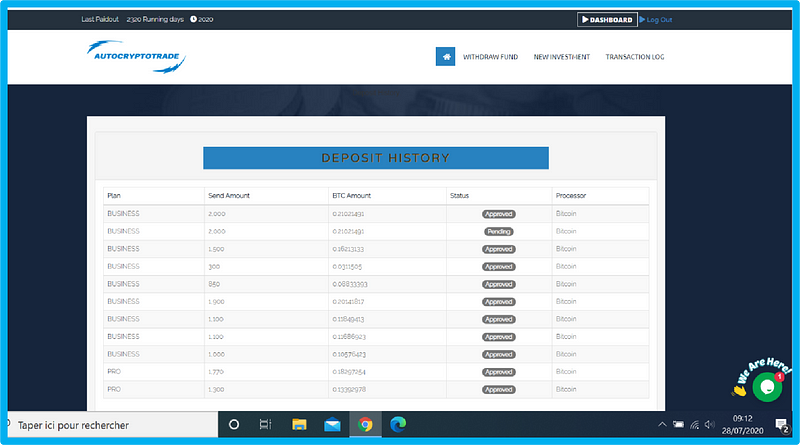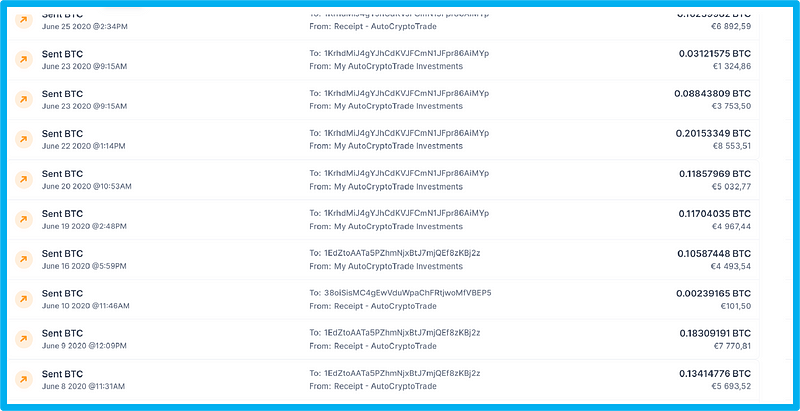Understanding the Risks: My $78,000 Bitcoin Scam Experience
Written on
Chapter 1: The Allure of Easy Money
It all started with a notification that had me racing to my desk. The funds had landed in my digital wallet, and after organizing everything in under an hour, I felt on top of the world. Just months later, I envisioned earning $4,000 a month—financial independence was just around the corner. I couldn't wait to share this excitement with Santiago, my new acquaintance who introduced me to this crypto-trading platform.
Santiago quickly responded, expressing his happiness for me. Little did I know, the son he mentioned was a figment of his imagination—just like the entire venture I was about to embark upon.
Scams Seem Absurd Until You Experience One
In May 2020, Santiago reached out to me via LinkedIn. Our mutual interest in Bitcoin sparked a lengthy conversation, during which he introduced me to AutoCryptoTrade. This platform promised fixed interest rates regardless of market fluctuations, but what really captivated me were the rapid returns.
The prospect of earning up to 10% in just days was enticing. My initial investment of $100 in Bitcoin quickly yielded a profit, prompting me to invest more. By the week's end, I had made an effortless $50, which fueled my optimism. However, life threw a curveball when my niece was diagnosed with cancer, and I was eager to help cover her medical bills.
That's when the situation took a turn for the worse.
Before I knew it, the company requested an "environmental tax" due to the carbon impact of Bitcoin transactions. It was a legitimate-looking fee that I hastily paid, believing it to be necessary. Soon after, I was told that withdrawals would be paused for a couple of weeks for system upgrades. Santiago even called to reassure me, suggesting I keep investing small amounts to maximize my returns once the system was back up. I thought I was making a smart decision.

The moment of clarity hit me like a ton of bricks. I realized I had been scammed. The sinking feeling in my gut was undeniable. “What should I do now? Fight back or give in?” I questioned myself.
Chapter 2: The Search for Santiago
My quest for answers led me to Santiago, but tracking him down was no easy feat. I attempted to reverse-search the images he had shared, only to find nothing. The company used a legitimate phone number and address, even masquerading as a subsidiary of an established platform called Avatrade. They removed Avatrade's branding before I could use it against them.
In desperation, I reached out to a tech-savvy friend for help, but he informed me that hacking into Santiago’s site would be nearly impossible. Undeterred, I devised a plan to confront him.
I called Santiago through WhatsApp, intending to catch him off guard with a video call. The ruse worked—when the screen connected, I saw a disheveled background that didn’t match his polished online persona.
As he hurried to end the call, I confronted him about the scam, exaggerating my claims about having gathered evidence. Surprisingly, he offered me a job, claiming they wanted to hire me and that I could earn back my losses. It felt more like a threat than an opportunity.
I declined and insisted on getting my money back. Santiago's response was a mix of disappointment and resignation. That was the last I heard from him.

The aftermath was devastating. Sleepless nights and regret plagued me. I was tempted to keep pursuing the matter, but deep down, I knew the real battle was internal. Recognizing my mistakes was the first step towards healing.
Lessons Learned from the Bitcoin Scam
Cryptocurrencies can be both liberating and perilous. Their decentralized nature allows for swift transactions but also creates an environment ripe for fraud.
Yaya Fanusie from New American Security points out that a Bitcoin wallet's independence from third parties makes it a prime target for scammers. The anonymity of digital transactions complicates the process of bringing these criminals to justice.
To safeguard against falling prey to scams, here are four essential tips:
- Stick to reputable platforms—if you want to explore new options, use a separate portfolio.
- If someone pitches an investment, meet them face-to-face or via video call to verify their legitimacy.
- After receiving both good and bad news, avoid impulsive transactions.
- Just because a platform seems functional does not guarantee its legitimacy.
To all the fake Santiagos out there: consider this my parting shot.
Disclaimer
This article does not constitute financial advice. Any actions taken are solely at your own risk. The fraudulent website mentioned is still operational—please steer clear of it.
Join my email community here ? & ask me anything here ????
The first video titled "How Americans Are Losing Their Life Savings To Crypto Fraud" provides an eye-opening perspective on the dangers of cryptocurrency scams.
The second video, "$70 Million Lost In Scam - Do we hit BTC $52,000?" delves into the financial ramifications of these fraudulent schemes.